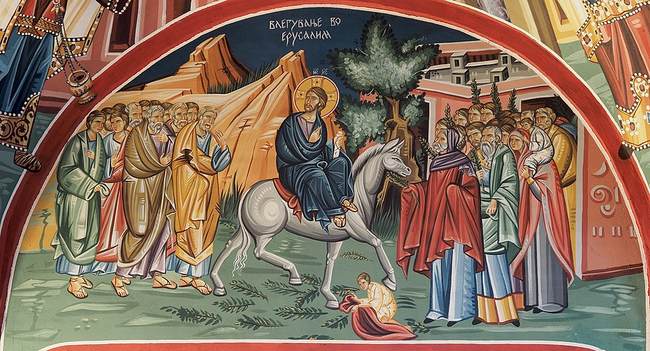
This morning’s Gospel reading is Luke 19:28–40:
Jesus proceeded on his journey up to Jerusalem. As he drew near to Bethphage and Bethany at the place called the Mount of Olives, he sent two of his disciples. He said, “Go into the village opposite you, and as you enter it you will find a colt tethered on which no one has ever sat. Untie it and bring it here. And if anyone should ask you, ‘Why are you untying it?’ you will answer, ‘The Master has need of it.’” So those who had been sent went off and found everything just as he had told them. And as they were untying the colt, its owners said to them, “Why are you untying this colt?” They answered, “The Master has need of it.” So they brought it to Jesus, threw their cloaks over the colt, and helped Jesus to mount.
As he rode along, the people were spreading their cloaks on the road; and now as he was approaching the slope of the Mount of Olives, the whole multitude of his disciples began to praise God aloud with joy for all the mighty deeds they had seen. They proclaimed: “Blessed is the king who comes in the name of the Lord. Peace in heaven and glory in the highest.” Some of the Pharisees in the crowd said to him, “Teacher, rebuke your disciples.” He said in reply, “I tell you, if they keep silent, the stones will cry out!”
May all our readers have a blessed and joyous Palm Sunday! In churches all over the world, the faithful gather to recall the joy of Jesus’ triumphal entry into Jerusalem, and to then recall the entire Passion story in our lengthy Gospel reading. Today, we read the mournful story from Luke 22 and 23, in which Jesus institutes the Eucharist at the Last Supper and is then betrayed, handed over, tortured, and finally crucified. What starts in joy today ends with Jesus’ burial in our Gospel.
Rather than offer a reflection on that passage, however, I want to focus on the Gospel reading read before our procession into the Mass. We read in Luke 19 how the disciples prepared for this entry to Jerusalem according to Jesus’ instructions, and how the disciples and all of their followers cheered Jesus as their new king — just days before most would abandon Him and call for His blood.
This part of our Gospel strikes me most today — Jesus’ response to the Pharisees, who rebuke Jesus for the celebrations of His disciples. Jesus laughs it off, telling the Pharisees that “the stones will cry out” if they remain silent. This seems especially intriguing, given that Jesus knew full well that in just days these followers would either remain silent or call for His execution in just a few days.
And yet, He allowed them to feel the full joy of His deliverance in these few moments of triumph. Why? Jesus could just as easily have warned them instead to reserve their celebration as premature, or to preach to them in this moment on the need to remain steadfast in the face of the adversity He knew was coming. Instead, He let them celebrate and hail Him as their salvation nonetheless without reservation.
But is this not the path we all tread? Do we not proclaim our salvation and celebrate it, only to fall into sin again and again — sin that denies Jesus’ lordship and rejects that same salvation?
This week, I went to confession as part of my Lenten observance — which is not one of my favorite sacraments, as I’ve mentioned repeatedly. I particularly dislike face-to-face confessions, much preferring the Old Catholic style of dark chambers and screens. And for whatever reason, I usually like to go somewhere other than my own parish for confessions, simply because my sins embarrass and humiliate me, and it’s somehow easier to take when I’m confessing to a priest whom I don’t know. (No one has to explain to me that this is not particularly courageous.)
On this occasion, I ended up in my own parish, face to face with my pastor, thanks to the massive effort at our parish to get as many confessions done during the week before Holy Week. My pastor is an excellent and caring confessor blessed with selective amnesia, as all good priests are, and took the time to make me feel comfortable. He discussed the root issues of my sins at some length, offering wisdom and insight that I didn’t have before. It truly was one of the most relieving experiences I’ve had in confessions, and I left the church ready to hold up a palm and lead the procession today.
And then it hit me today, while contemplating Palm Sunday, that this is no coincidence or mistake. When we allow the Holy Spirit to enter our hearts and conform our wills to His, we are all ready to hoist the palms and publicly hail our King. When we sin, however, we’re suddenly our own kings and queens, and start getting a lot less enthusiastic about processing through the streets to proclaim our faith. Today’s Mass is created to remind us of this cycle, not just in the historic re-enactment of this parade but in our own everyday lack of faithfulness and predilection toward silence and rejection of His lordship.
It also reminds us of where that path ends: the tomb.
The world sets us up for that kind of failure, too. The Pharisees in this passage represent that; the world is forever telling us to shut up about our faith, or to keep it within the four walls of the Church. We are all expected to be reasonable and not to proclaim our joy in salvation, for a variety of reasons. Too often we also see that as reasonable, forgetting our mission to lovingly proclaim the Good News so that all may hear and decide for themselves whether to join in love and faithfulness in God. Our own sins bog us down as well, combining to form at least the kind of apathy that afflicted those in Jerusalem that started off the week in joyful celebration, if not those who became outright hostile to Jesus by the end of the week.
However, this week and Lent also teaches us that we have an open invitation to return to the procession, even if we have fallen away for whatever reason. Lent and Easter are seasons of renewal, and Christ’s forgiveness and mercy fuels that renewal. During the Easter season, we will read about Peter’s renewal after Jesus’ resurrection after having denied Christ three times in the crisis. Peter tells us that story — how else could we possibly know it? — to remind us that we can always return to Jesus and receive His forgiveness.
And that leads us not to the tomb as our end, but to the Resurrection as our eternal home.
In this season, proclaim your joy and love of the Lord. Do not let the stones of the tomb do all the talking for you.
Previous reflections on Palm Sunday readings (all cycles):
The front page image is “Triumphal Entry of Jesus into Jerusalem,” a fresco in the Nativity of the Theotokos Church in Bitola, North Macedonia. Circa 1876. Via Wikimedia Commons.
“Sunday Reflection” is a regular feature that looks at the specific readings used in today’s Mass in Catholic parishes around the world. The reflection represents only my own point of view, intended to help prepare myself for the Lord’s day and perhaps spark a meaningful discussion. Previous Sunday Reflections from the main page can be found here.








